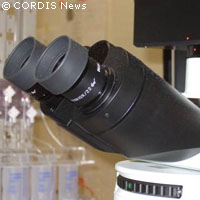Vitamin deficiency behind diabetics' vascular problems, study shows
British researchers have discovered that many of the health problems experienced by diabetes patients are due to a deficiency of vitamin B1 (thiamine). Some of the most serious health problems associated with diabetes are caused by vascular complications. These include damage to the kidney, retina and the nerves in the arms and legs, as well as heart disease and stroke. The study is published in the journal Diabetologia. Scientists from the University of Warwick measured the levels of thiamine in the blood plasma of type 1 and type 2 diabetics, and compared this to the levels found in the blood plasma of healthy people. The results were startling: the thiamine concentration in the blood plasma of type 1 diabetics was 76% lower than it should be, while for type 2 diabetics the figure was 75%. This lack of thiamine is linked in turn to a marker of complications in the vascular system, which probably reflects problems in the endothelial cells which line the blood vessels, and an increased risk of atherosclerosis (inflammation of the artery walls). According to the scientists, the problem is not caused by a lack of the vitamin in the diet, but by an increased rate of removal of thiamine from the blood into the urine. So why has this problem only come to light now? In the past thiamine levels were not measured directly but inferred from measurements of the activity in red blood cells of an enzyme called transketolase. These studies found normal levels of enzyme activity and assumed that this reflected normal levels of thiamine in the blood. In fact the normal levels of enzyme activity were due to increased amounts of two proteins, THTR-1 and RFC-1, that help to transport thiamine into red blood cells. These proteins were present in higher levels in response to the lack of thiamine in the body. The next steps for the researchers are to confirm the low blood plasma levels of thiamine in different populations with different diets; evaluate how thiamine or similar compounds could be used to correct the deficiency, and to investigate the mechanism which causes too much thiamine to be transferred from the blood and into the urine.
Countries
United Kingdom



